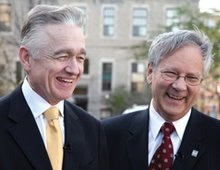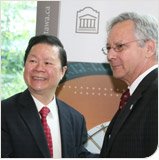 |
| Denis Rancourt at the courthouse on October 8, 2015 |
By Denis G. Rancourt
On October 8, 2015, there was the first hearing before the appellate court in the matter of the 2009 dismissal of tenured physics professor Denis Rancourt, in Ottawa before Divisional Court Judge Robert Scott (who travelled from Belleville for the hearing).
The Divisional Court hearing was to decide a university’s motion to strike (remove, disallow) the union’s affidavit of evidence about what occurred in the labour arbitration hearings, for which transcripts do not exist. After the hearing, Justice Scott said he would study the motion record further and provide his decision as soon as he can.
Justice Scott made interesting comments during the October 8th hearing, and the university’s tactics in the motion are also of note.
Brief history of the case
Tenured professor Denis Rancourt was fired by the Allan Rock administration of the University of Ottawa in 2009 over his grading of students in one advanced physics course. This TVO video interview from 2009 is a vivid summary of the academic dimension of the conflict:
A lengthy labour arbitration followed, in which it was shown that the university had employed a student spy (Maureen Robinson, using the false cyber identity “Nathalie Page”) who made extensive surveillance of professor Rancourt and of students and gave weekly reports to both the dean of science and University Counsel Michelle Flaherty (LINK).
During the lengthy arbitration hearings, the university’s hired lawyer Lynn Harnden spent most of the time presenting professor Rancourt’s political and professional views in a negative light. He went so far as to repeatedly suggest that professor Rancourt’s writings incited students to violence, and even showed this video at the hearing, since he had found it in one of the professor’s Playlists on YouTube:
On the central question, the arbitrator disregarded the hard evidence of grading (examination copies, and grading sheets), disregarded the dean’s admission that he had no evidence that any student did not deserve his or her grade, and upheld the dismissal in 2014.
The professors’ union announced in 2014 that it would appeal the arbitrator’s decision (LINK):
“While the decision not only upheld the Employer’s unjust dismissal decision, the arbitrator also made some troubling statements concerning Academic Freedom which can have a profoundly negative impact on academics everywhere.”
Happenings in the motion hearing
Following the union’s filing of its application for judicial review, the university brought a motion to strike the union’s affidavit about what occurred during the labour arbitration hearings. After much delay, the motion was finally heard on October 8, 2015.
Despite the fact that there is a large amount of documentary evidence (many exhibits) that Ms. Robinson was hired for surveillance and gave regular reports about her activities (including details about her use of a false cyber identity, and her misrepresentations in requesting information from third parties) (LINK),
and despite the labour arbitrator himself finding (LINK, see paragraph 58) “[a] report on Professor Rancourt’s address prepared by a University of Ottawa student and editor to the students newspaper (attending the talk with the purpose of monitoring the communication by Professor Rancourt), was entered into evidence”,
the university’s hired lawyer Lynn Harnden argued at the hearing that the dean of science had hired Ms. Robinson solely to help him organize his office.
Justice Scott (J) expressed some reservation about this. His exchange with lawyer Lynn Harnden (H) went like this:
J: This is where I’m confused about Ms. Robinson – she’s the editor of a newspaper and she’s sent in to tidy up his office?
H: That’s what Dean Lalonde testified he engaged her to do. He explained she also had another hat on as editor of student newspaper and took certain initiatives related to Professor Rancourt’s activities.
J: Any evidence how she was chosen, or just happened to be there? Seems a little unusual to me, that’s the only thing I noticed.
H: That she had this dual hat on? Not on the record how he chose her, but did take her on to organize this voluminous evidence and she took other steps.
J: There’s a reference somewhere in the materials to how she equated her role as a young woman trying to trap a pedophile?
H: There was reference in Prof R’s testimony of that allegation. She didn’t testify so we don’t have that. We …
J: Where did that reference come from then? She never said that? It’s not part of the record?
H: No it’s only a statement by Professor Rancourt alleging that she had said that or it’s said somewhere I’m not aware – she didn’t testify. […]
“No it’s only a statement by Professor Rancourt alleging that she had said that …” Here, Mr. Harnden appears to have forgotten about a lot of damning exhibits (LINK), including Ms. Robinson’s "pedophile email" report to the dean of science and to counsel Michelle Flaherty (LINK), and appears to have also forgotten that the "pedophile email" was described in the union's factum for the very motion being heard (LINK, see paragraph 41(a)). This lapse of memory was acknowledged later in the hearing and corrected by the union’s lawyer.
Justice Scott was also somewhat baffled that the parties had allowed the labour arbitration to proceed without a recording or transcript of the lengthy hearings:
J: Let me stop you. I’m confused – in your affidavit material it indicates the nature of the hearing – you started off by giving us the breakdown on that – “28 days, 160 documents.... Rancourt there 13 days...” – doesn’t that fly in the face of the reason why arbitrations aren’t recorded? They’re recorded because they’re short, to the point, get done in reasonable time – but when you have a really complicated one such as this one, it would be necessary for anyone to make sense of it later on to have it recorded. Do you see what you’re faced with – or what I’m faced with – ultimately the Divisional Court faced with – how do you review, just take a look at it? Assume?
[…] My point was that technology is there that would allow for accurate recording. Might be helpful for someone sorting it out later. I also understand what this thing is built on.
Note that it is precisely because there is no transcript or recording that the union needed to file an affidavit about what occurred in the labour arbitration hearings in order to appeal the labour arbitration decision, exactly the affidavit that the university wants to strike.
Put simply, if the university succeeds in convincing the motions judge to strike the affidavit, then the union will be deprived of its necessary evidence about what it affirms actually happened at the arbitration, and the appeal will be almost guaranteed to fail.
The test for allowing the affidavit is that the affidavit evidence is otherwise not available, and is necessary to attack the arbitration decision on allowed grounds for appeal. In common language, this "test" is called a “no-brainer”.
The actual arguments as to whether or not to strike the union’s affidavit were very interesting, in that they diverged somewhat from this test.
The union argued that the affidavit evidence was not otherwise available, was essential for its appeal, and that the stated grounds for appeal were legally allowed grounds for appeal.
Mr. Harnden, for the university, argued that the affidavit should not be accepted because the university will contradict evidence in the affidavit with its own affidavit, later in the actual judicial review hearing, and because to accept the evidence in the affidavit would amount to the court inferring that the arbitrator had “blundered”:
H: Let’s just think about the significance – she’s [the affiant is] telling this court that the decision maker heard all of those comments of Professor Rancourt. She’s making it clear that the Arbitrator heard those concerns from Professor Rancourt, then the Applicant would have the court that the expert Arbitrator disregarded those concerns, disregarded comments by APUO in closing submissions, and blundered. They’re asking this court to draw the inference from the fact that the Arbitrator didn’t go out of his way to state ‘look I’m referring to fact that Professor Rancourt conceded accuracy because that means I can rely on those portions of the documents’. Given how rare it should be that affidavit evidence is heard, it would not be appropriate to make that exception in a case where this court would have to find, in effect, that Mr. Foisy [the arbitrator] didn’t exercise the expertise that should be held by any competent decision maker with respect to a document that has not been identified by a witness, and which has been identified with respect to its potential failure many times in the proceeding. We know Mr. Foisy heard Professor Rancourt’s comments. The court should not be too quick to infer that he made the blunder that my friend suggests.
Basically, as I read it, the university's hired lawyer Lynn Harnden is saying that the affidavit should be blocked here and not be seen by the panel of three Divisional Court judges that will hear and decide the actual appeal itself that claims arbitrator errors because to allow the affidavit to pass would be equivalent to Justice Scott “inferring” that the arbitrator “blundered”.
In other words, the affidavit evidence is so damning of the arbitrator's decision that it should not be allowed to be considered by those judging the arbitrator's decision.
Despite Mr. Harnden's high intelligence and despite his well crafted argument, the word “circular” comes to mind.
Overall, in my opinion, Mr. Harnden very ably worked to “shift” the question before the motions judge away from the rational and practiced legal test for accepting affidavit evidence and towards questions that properly belong to the appeal itself: 1. What evidence about what occurred during the arbitration is reliable, if it is opposed by a university’s own affidavit?; and 2. Did the arbitrator make errors, and were these errors serious enough for his decision to be set aside?
The university’s court-filed factum (i.e., written argument) for the motion is HERE-LINK.
The union’s court-filed factum for the motion is HERE-LINK.




No comments:
Post a Comment